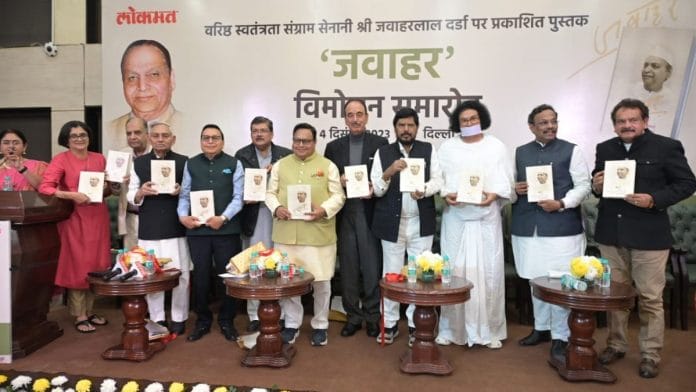New Delhi: It’s not often that you see leaders from different political parties come together on one stage. But that’s what happened at a recent evening in Delhi’s Constitution Club that saw TMC’s Saugata Roy, BJP’s SP Singh Baghel, SP’s Danish Ali, Congress’s Adhir Ranjan Choudhary and Mukul Wasnik, and Union minister Ramdas Athawale all come together for the launch of a book on Jawaharlal Darda alias Babuji, Congress stalwart and founder of Lokmat.
It was an evening spent narrating anecdotes that underlined Darda’s generosity and the statesman politician he was. Bitterness is growing in politics these days but Darda never had poor relations with anybody. We all need him in today’s politics, BJP general secretary Vinod Tawde said. Stories of the political history, Janata Party government, Emergency and the politics of the present era—all found mention.
Darda, the Gandhian
In the 1960s, when Jana Sangh leader Atal Bihari Vajpayee went from Mumbai to Yavatmal for an election campaign, the person who arranged vehicles for him was Jawaharlal Darda.
Darda’s son and former Rajya Sabha MP Vijay Darda who was present at the launch of the book Jawahar, written by Aparna Velankar, said that when Vajpayee came to Yavatmal for the election rally, two vehicles were already present at the station. “Atal ji asked why two vehicles, the driver said that Darda ji had sent two vehicles in case one breaks down, the other can ensure Vajpayee ji reaches on time to deliver the speech.”
Underlining the healthy relations politicians cutting across parties enjoyed, Vijay Darda said in those days relationships were important, love was there. “My father taught me and my brother to maintain these relationships,” he said.
A Gandhian, Jawaharlal Darda had taken part in the Quit India Movement and later was an MLA in the Maharashtra cabinet for 20 years. He was an influential leader in the Yavatmal region.
The book captures his life as a Gandhian, freedom fighter, statesman, philanthropist, social worker and senior minister in Maharashtra government.
Speaking in a hall full of MPs, MLAs, ministers and journalists, Congress leader Janardan Dwivedi said that he got a sense of creativity after reading the book. “This is not a biography but a poetic expression of his life.”
A Marathi edition of the book has already been launched in Mumbai.
Also read: UCC to Modi’s return in 2024, Delhi book launch discusses an ‘inevitable’ Hindu Rashtra
Shelter for Fernandes
Despite being a Congress MLA, Jawaharlal Darda gave shelter to George Fernandes who went underground during the Emergency period.
During the tumultuous Emergency period, many political figures faced significant challenges, and the actions of leaders like Jawaharlal Darda became pivotal in shaping the political landscape.
Vijay Darda said that Fernandes had stayed at their house for three days. The revelation left the Congress leaders present at the Constitution Club surprised and they were seen laughing out loud.
Talking about his father’s view on journalism, Vijay Darda said there were a lot of reports against him published in Lokmat itself, the paper that he had founded. A report against Darda in Lokmat had created ruckus in the assembly for three days. “The reporter told Darda that you suffered because of me, but Darda retorted and said that you are doing your work and I am doing mine”.
“His focus was always on impartial journalism,” said senior journalist Alok Mehta.
In his signature style, RPI’s Ramdas Athawale described Darda as someone who cared for the poor and underprivileged. “Jo gareeb, dalit, kisano, majduro ka hamesha puchte the haal, unka naam hai darda Jawaharlal,” he said.
Former Congress leader Ghulam Nabi Azad, who was close to Darda said, “He was not only a brave freedom fighter but also a perfect person because he treated people of all religions, castes and creeds with humanity.” When Azad was youth congress president in 1980s, he and Darda came in contact. Azad also contested Lok Sabha polls from Maharashtra.
According to Azad, “Jawahar ji” was very firm on his principles and his words are relevant even in today’s times. “He also fully respected his ideological opponents. In today’s times, it is difficult to have a personality like Jawahar ji. Even today the world of journalism and politics feels his absence. His thoughts will move forward through this book,” he said.
During his address, Dwivedi quoted Gandhi’s writing on principles of politics. He swiftly mentioned Azad, saying when the former Congress leader had come to Delhi in 1980s, Dwivedi once asked him why the young man had joined the Congress. Azad had replied saying he was influenced by Gandhi.
Dwivedi was trying to drawing home a point that was hard to miss vis a vis Azad.
“I want Gandhi to still be alive in his (Azad’s) mind.”
(Edited by Anurag Chaubey)






